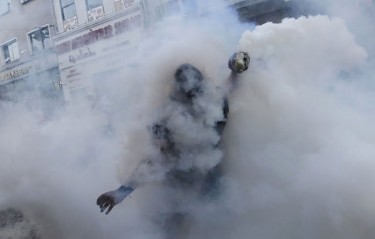[All links lead to sites in Portuguese]
This post, written by Bruno Fonseca and Natalia Viana for Agência Pública, was originally published as a report entitled “Bomba brasileira na pele turca” (Turks Feel a Brazilian Bomb Firsthand) and is part of the special coverage #IndústriaBrasileiraDeArmas (Brazilian Weapons Industry) on the weapons lobby and industry in Brazil. The story will be published in a series of three articles on Global Voices Online. This is the third part of the series.
Check out the second post: Brazilian Weapons Firm Exports Arms to Arab Countries
The Brazilian federal government agreed to the purchase of thousands of non-lethal weapons from Brazilian arms firm Condor – the same company that furnished the tear gas used against protesters in Turkey – to be used by the police forces in all the host cities of the 2013 Confederations Cup and the 2014 World Cup for the sum of 49.5 million reais (22 million US dollars).
The agreement with Condor S.A. Indústria Química, signed on 26 November, 2012 to last until 31 December, 2014, provides for the supply of different types of weapons, such as 2,200 non-lethal short distance kits, which include pepper spray and pepper foam, tear gas grenades with traceable chips, indoor and outdoor moral effect grenades and explosive light and sound grenades; besides that, 449 non-lethal short distance kits with rubber bullet cartridges and impact expansible cartridges – bullets that expand when they touch the skin, avoiding perforation.
Apart from that, the agreement includes the purchase of 1,800 electric weapons for launching energized darts – the so-called Taser guns, 8,300 moral-effect grenades, 8,300 light and sound grenades, 8,300 triple smoke tear gas grenades, and 50,000 pepper spray canisters.
Find the entire agreement here.

The tear gas exported to Turkey was also bought by the Brazilian federal government for use during the 2014 World Cup and Olympics. Photo by Agência Pública. Used under a Creative Commons license
Condor's non-lethal weapons are largely employed by police forces all over the country as well as by the federal government. Federal programs buy such weapons, for instance, to be used by the Unities of Pacifying Police (UPPs, initials in Portuguese) in Rio de Janeiro and by police forces in 12 States involved in the program “Crack, É Possível Vencer” (Crack Cocaine, It's Possible to Win) including shock pistols, Taser guns, and pepper spray. The Brazilian government has already allocated 49 million Brazilian reais (approximately 22 million US dollars) to Condor just to pay for the weapons to be used during the Confederations Cup this year and in the 2014 World Cup.
The Brazilian tear gas exported to Turkey was also bought by the federal government to be used during the 2014 World Cup and the 2016 Olympic Games.
In April 2012, according to Transparency Portal [a website created by the federal government to inform on government's expenditures with the World Cup 2014], the federal government spent 1.5 million reais (approximately 669,000 US dollars) on the purchase of non-lethal ammunition from Condor to be used by the army to “ensure law and order in the residential compounds of Alemão and Penha”. Among the items which were purchased there were 1,125 explosive light and sound grenades (GL 307), 500 multi-impact pepper grenades (GM 102) and 500 smoke grenades, 29,500 rubber bullet cartridges and 700 random movement tear gas grenades (GL -310) – the same which were used against the protesters in Turkey.
In June, the government purchased weapons from Condor for the security of Rio+20 United Nations Conference on Sustainable Development, amounting to a total of 1.3 million reais (approximately 579,000 US dollars). Among them were more than 900 pepper spray canisters, 1,300 triple tear gas grenades, 870 explosive light and sound grenades, and 5,000 12-calibre cartridges with rubber bullets.
Justice?
While the Brazilian Agency for the Promotion of Exports and Investment encourages the export of arms to countries such as Turkey and the United Arab Emirates, the use of the same non-lethal arms is questioned by the Brazilian justice.
In November 2012, the federal prosecutor for citizen's rights decided to investigate the damage brought by these arms to the health in the country. At the request of the organization Tortura Nunca Mais (Torture Never Again) from São Paulo, a working group comprising representatives of the Ministries of Justice, Defense and Health and of the Secretariat of Human Rights from the Presidency, as well as the Federal and State Police and the Municipal Guards, was created with the aim of monitoring bills on the subject. This was deemed necessary as there is no national rules to guide decisions and ensure an acceptable use of such weapons.
The working group shall also carry out a comparative study about police-training programs as well as studies about the consequences to the health of people targeted by these weapons, especially those that make use of electric shock and chemical components. Wilson Furtado, from Torture Never Again, observed:
Nossas polícias estão usando este tipo de armas supostamente não-letais de maneira ostensiva… O policial, em vez de deter a pessoa, atira e pronto, atingindo principalmente jovens que estão protestando.
Our police are using this type of allegedly non-lethal weapons ostensibly…Instead of arresting the person, the policeman fires the non-lethal weapon and that is it, targeting mainly the young people during their protest marches.
The organization asks for rules that regulate the use of non-lethal weapons, defining the type of authorized weapons and norms of purchase, control and use, as well as the mechanisms of information to citizens.






